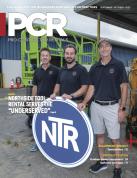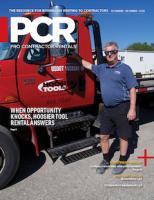Kohler shares its view on hybrid equipment power
Bauma show sets stage for Kohler's K-HEM hybrid electrical and mechanical combined power generation units.
The Bauma trade fair held in Munich always offers a glimpse of what is coming to the market in terms of state of-the-art technology and latest developments. This year, Kohler officials shared its view of what’s coming in equipment power.
In this context, Kohler is an alternative player, going against the flow with respect to traditional engines and responding to the new demands of a constantly changing market for solutions that are more dynamic and flexible and greater focus on what customers really need.
Kohler’s aim is to facilitate the job of constructors by improving the performance of their machinery. In order to do this, it offers the support they need to choose the best solution. By expanding its range of hybrid solutions, Kohler aims to ensure everyone can choose the best engine for their application.
Going electric
Electrification refers to the design of a system running on electricity: in the construction industry, these can be hybrid systems or purely electrical systems. In the panorama of hybrid solutions, there is also a distinction to be made between hybrid in series and hybrid in parallel: a hybrid system in series simply converts chemical energy into mechanical energy, and this is converted in turn into electrical energy. A parallel hybrid system can deliver mechanical energy, coming from chemical energy, at the same time as it delivers electrical energy, coming from a previously-charged battery pack. This offers the advantage of using mechanical and electrical energy simultaneously. The combination of the two types of energy is the main benefit of any parallel hybrid system.
Kohler offers that technology through its K-HEM system. The range of K-HEM hybrid units is based on the concept of a parallel hybrid system: this enables constructors to fit K-HEM units onto the hydraulic system of their applications, just like they used to do with conventional engines.
Later, when customer decide to re-engineer their machines to exploit the full benefit of running applications on electrical power, Kohler engineers will be ready to support them step by step to design increasingly efficient machines.
Kohler does not intend to drive the process of electrification at all costs but is committed to exploiting the potential of every source of energy to reach a truly optimized performance of applications based on operating cycles. As a result, Kohler’s strategy is to extend its range of hybrid solutions.
After analyzing the market case by case, Kohler engineers realized there are a series of applications fitted with over-dimensioned engines for specific features. Their operating cycles do not need all the power that the engine is capable of delivering or it does not need it all of the time.
Consequently, Kohler engineers identified two thresholds that are particularly interesting: 19 kW, which is the limit for international Stage V legislation’s requirement for the use of diesel particulate filters (DPF), and 56 kW above which the same legislation also requires the use of selective catalytic reduction (SCR).
In order to offer an alternative solution capable of tapping on these two power nodes, the new K-HEM 2504 runs alongside the K-HEM 1003 launched last November: the K-HEM 2504 is a hybrid unit generating a combination of electrical and mechanical power consisting of a KDI2504TCR 55.4 kW diesel engine that complies with Stage V legislation and is without SCR, and a 48-volt electric motor that guarantees 19.5 kW peak power and 9 kW continued power, and maximum safety levels due to the voltage.
The new K-HEM 2504 hybrid unit offers even more efficient DPF management making the regeneration processes fully transparent for the end user, as it is possible to exploit the temperatures reached to recharge the battery pack.
The design of the Kohler KDI 2504TCR engine makes it the perfect partner for an electrical unit: KDI engines deliver a very high performance and the combination with electrical power can equal, if not exceed, the performance offered by higher spec engines in terms of horsepower, as well as a smaller footprint.
Kohler’s hybrid solutions are not designed to offer a simple downsizing, but to be part of a broader concept of the rightsizing of applications, namely choosing the right size: the most suitable size for each specific application. Kohler offers constructors a full range up to 105 kW, which investigates different sources of energy that are increasing and diversifying as time goes by.
Hybrid solutions save OEMs the complexity of post-processing systems and add extra power and they also offer a range of possibilities.
They can simply replace a conventional engine without worrying about installation problems because K-HEM units have the same integration with the hydraulic system or with the mechanical transmission as a diesel engine. Or, the application can be re-engineered to make it more efficient: the current generated by the electric motor can run a series of actuators and guarantee more punctual and optimized management, leading to improved machine performance as a whole.
K-HEMs allow excavators to have faster and more precise movements than older units with improved efficiency and productivity. They can make sure aerial platforms exploit the availability of electricity when peak power is required and then use the diesel engine as standard for cycles operating at low speeds. For the same reasons, Kohler designers believe K-HEMs are a perfect match for applications like welding equipment, forklift trucks, telescopic lifting equipment, tire or track excavators, chip grinders and cable tensioners.
Kohler hybrid units guarantee the general optimization of machines and offer the possibility to store surplus energy in the batteries that can be delivered when needed, drastically reducing running costs.
The applications will enjoy the inherent flexibility of parallel hybrid systems with the possibility to run on mechanical energy, on mechanical energy plus electrical energy, or with electrical energy alone. This will soon available for the K-HEM range.














